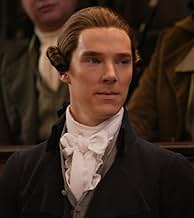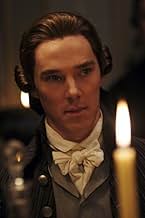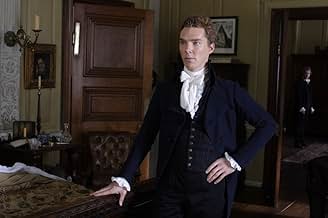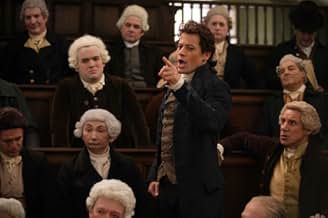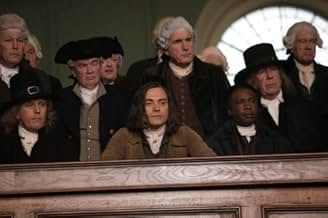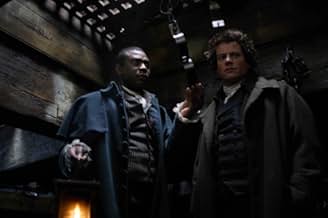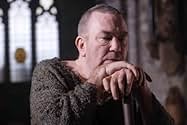The idealist William Wilberforce maneuvers his way through Parliament, endeavoring to end the British transatlantic slave trade.The idealist William Wilberforce maneuvers his way through Parliament, endeavoring to end the British transatlantic slave trade.The idealist William Wilberforce maneuvers his way through Parliament, endeavoring to end the British transatlantic slave trade.
- Awards
- 3 wins & 6 nominations total
Ciarán Hinds
- Lord Tarleton
- (as Ciaran Hinds)
- Director
- Writer
- All cast & crew
- Production, box office & more at IMDbPro
Storyline
Did you know
- TriviaThe scene where William Wilberforce (Ioan Gruffudd) sings "Amazing Grace" at the card house was sung by Gruffudd at that moment. In the last several takes, a playback was used, but it is Ioan singing. Director Michael Apted had no idea whether or not Gruffudd could actually sing. Little did he know, Ioan is an accomplished soloist and choir singer. With a little practice, Ioan performed for the first time on-set while the cameras were rolling. All much to the surprise of the cast, crew, and director.
- GoofsThere were at least 3 grammar mistakes: several uses of "I" when "me" should have been used. Wilburforce also says "By who?" As a graduate of Cambridge, he would have said, "By whom?"
- Quotes
John Newton: Although my memory's fading, I remember two things very clearly. I'm a great sinner and Christ is a great Savior.
- ConnectionsFeatured in Tavis Smiley: Episode dated 23 January 2007 (2007)
Featured review
To see this well mounted but simplistic and worshipful bio-pic, one would think that William Wilberforce (and to a lesser extent, young Mr. Pitt) were the only members of Parliament to speak out against the war with America, then against the slave trade. Not so, folks - next time you're in Westminster Abbey, you might check out the large abolitionist monument dedicated someone whose fight against the slave trade predated that of Wilberforce and was widely recognized during his liftetime: Charles James Fox.
Yes, that same Fox so inaccurately identified in the film as a tame follower of Wilberforce, agonizing over the slavery question and finally swayed by the young man's eloquence. Truth is, Fox - whose pro-American, pro-French Revolution, anti-slavery and anti-absolute monarchy sentiments put him at odds with George III during nearly his entire political career - was a "phenomenon of the age" in the words of a contemporary, and one of Parliament's most eloquent speakers on a range of causes that certainly rivalled those of Wilberforce.
He was also only 10 years older than Pitt, something you'd never guess from the fright-wig makeup Michael Gambon wears.
You can understand why such scripting decisions are made: Wilberforce has to be young and sexy to be attractive, and his more priggish attitudes (he often urged Parliament to pass laws prohibiting all amusements on Sundays, and was appalled at what he deemed Fox's immorality: his drinking, gambling and womanizing) have to be eliminated. It's a shame, because Wilberforce was all the more interesting for being a complex human - but it's so much easier to make him terribly young, eager and dashing, and all other politicians of the day old and timid.
Other strange egregious errors: Fox was not a lord, nor would you find any lords among Wilberforce's fellows in the House; lords do not sit in the House of Commons. The character identified as the king's son, the Duke of Cumberland, would have been about 12 years old at the time of the movie's action. Pitt was prime minister for some 20 years, yet his cautious political trimming was at least partly responsible for the slave trade continuing as long as it did.
It was a pleasant enough film and rousing in parts, but I prefer my history more red-blooded and reflective of real human beings.
Yes, that same Fox so inaccurately identified in the film as a tame follower of Wilberforce, agonizing over the slavery question and finally swayed by the young man's eloquence. Truth is, Fox - whose pro-American, pro-French Revolution, anti-slavery and anti-absolute monarchy sentiments put him at odds with George III during nearly his entire political career - was a "phenomenon of the age" in the words of a contemporary, and one of Parliament's most eloquent speakers on a range of causes that certainly rivalled those of Wilberforce.
He was also only 10 years older than Pitt, something you'd never guess from the fright-wig makeup Michael Gambon wears.
You can understand why such scripting decisions are made: Wilberforce has to be young and sexy to be attractive, and his more priggish attitudes (he often urged Parliament to pass laws prohibiting all amusements on Sundays, and was appalled at what he deemed Fox's immorality: his drinking, gambling and womanizing) have to be eliminated. It's a shame, because Wilberforce was all the more interesting for being a complex human - but it's so much easier to make him terribly young, eager and dashing, and all other politicians of the day old and timid.
Other strange egregious errors: Fox was not a lord, nor would you find any lords among Wilberforce's fellows in the House; lords do not sit in the House of Commons. The character identified as the king's son, the Duke of Cumberland, would have been about 12 years old at the time of the movie's action. Pitt was prime minister for some 20 years, yet his cautious political trimming was at least partly responsible for the slave trade continuing as long as it did.
It was a pleasant enough film and rousing in parts, but I prefer my history more red-blooded and reflective of real human beings.
Details
- Release date
- Countries of origin
- Official site
- Language
- Also known as
- Ân Điển Diệu Kỳ
- Filming locations
- Production companies
- See more company credits at IMDbPro
Box office
- Gross US & Canada
- $21,250,683
- Opening weekend US & Canada
- $4,305,000
- Feb 25, 2007
- Gross worldwide
- $32,120,360
- Runtime1 hour 58 minutes
- Color
- Sound mix
- Aspect ratio
- 1.85 : 1
Contribute to this page
Suggest an edit or add missing content



